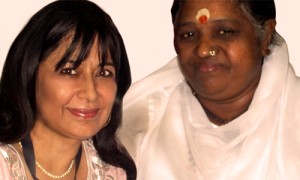 “The best way to find yourself is to lose yourself in the service of others,” said Mahatma Gandhi; and it certainly holds true with Mata Amritanandamayi, or “Hugging Amma” as she is popularly known. She has given 32 million hugs, spreading what she calls “seeds of love, compassion and selflessness” with her hugs around the world.
“The best way to find yourself is to lose yourself in the service of others,” said Mahatma Gandhi; and it certainly holds true with Mata Amritanandamayi, or “Hugging Amma” as she is popularly known. She has given 32 million hugs, spreading what she calls “seeds of love, compassion and selflessness” with her hugs around the world.
Amma’s life is truly inspirational. Born in a poor family in Kerala, India, she has dedicated her life to the service of humanity with love and kindness as well as a simple belief that with true love everything is effortless. She had no formal education but is considered to be one of the most well-known spiritual teachers of India as she has tirelessly dedicated her entire life to educating people about the power of love and happiness.
It was a great privilege to meet Amma and learn about her life when she visited Boston recently. Her message is profound in its simplicity as she says: “Happiness is also a decision in life, a firm decision that whatever happens in life, I will be happy and I will be strong.”
Amma
Q-1. You come from a family of fishermen, and displayed intense love for God at a very early age. Is your family religious and has anyone else in your family displayed similar love for God and humanity?
AMMA: My mother was very religious and was very punctual with her prayers and observances. Also, the people of the village where I am from have traditionally been very religious. If you were to visit the village at dusk, you would see lamps lit in front of small altars in all houses. Families gather together and pray. All year-around you can hear the reading of the Bhagavatam [the spiritual text describing the life and times of Lord Krishna] and temple festivals taking place.
Traditionally, people in these villages are very hospitable and compassionate. I can remember in my childhood, how my father would give permission to many other families to build their dwellings on the family property. Children from all the neighboring houses would all play together and the mothers would not worry at all if they did not see their children, for they knew that their children would be fed along with the other children in some other home, and if they were tired they could rest or sleep in other houses. Even so, people lacked an in-depth knowledge of the essential principles underlying religious observances or spiritual practices.
Q-2: It is said that you are a Krishna Bhakta from a very young age. What inspires you most about Sri Krishna and his teachings?
AMMA: I always knew that all forms of God are just different expressions of one eternal principle. Even if an actor plays different roles in movies, the actor himself does not change. There are many temples of Lord Krishna in Kerala and he was also one of the main deities in my mother’s shrine.
Sri Krishna always had a smile on his face throughout his life. There was never a single situation where the smile disappeared. He was born in a dungeon, with his own uncle intent on killing him as soon as he was born. From there started a whole series of trials and tribulations. Still, he made his entire life a celebration. His smile conveys the teaching that if one is established in the awareness of the Supreme Self, one can maintain one’s mental equanimity even when facing all types of challenges. Like any other decision, happiness is also a decision—a firm decision that, whatever happens in life, I will be happy, I will be strong. Sri Krishna’s life is a testimony to this ideal.
Sri Krishna played all the different roles in his life to perfection—be it that of a cowherd, an ambassador of peace, a warrior, a king, a charioteer, a master, a disciple, etc. He is a perfect role model for people from all walks of life. Until the end of his journey on earth, he never stayed away from performing actions, though he had nothing to gain from doing so. Everything he did, he did for the sake of the world. Whether we perform actions continuously or remain idle, our bodies will ultimately perish. Thus, it is better to wear away doing good actions in service of others than getting rusted like a tool sitting idle on a shelf.
Q-3: Of all the religious scriptures such as Ramayana, Geeta, Quaran, Bible and other ancient books, which one is your favorite and what are your favorite lessons from them?
AMMA: I have not received much formal education. I have studied only up to the 4th grade. I have not studied any scriptural texts, so have no favorites. What I say is from my own experience, not from any scriptural learning. Right from a young age, I had the awareness of my true nature and also an understanding of the ephemeral nature of the world.
The essence of all religions is one and the same: universal love and compassion. It is to see the other person as yourself. When 100 pots of water are placed out in the sun, you see the reflection of the sun in each and every pot. That does not mean that there are 100 suns. The sun is only one. In the same way there is nothing other than the Self. That is the reason why in Sanatana Dharma the Creator and creation are not seen as two but one. It is the Creator who has become the whole of creation. God is nothing but the Supreme Consciousness immanent in every aspect of creation.
Q-4: Tell us about your family. Are you still close to them with your busy life? If so, how do you manage your time?
AMMA: The whole world is my family. As far as my biological family is concerned, my sisters and brothers are very actively involved in service activities of the ashram. They too come to have darshan. I am not able to spare any separate time for them. But, they know very well that my life is for the world and all are my family. They have no complaints about it and are very supportive of all the initiatives of the organization.
Q-5: What is a typical day for Hugging Maa, a sort of daily routine?
AMMA: I spend almost all of my time with people. I give talks, sing bhajans, conduct guided meditations and hold question-and-answer sessions. After that I meet each and every person who comes for darshan. I spend most days giving darshan to all those to come from morning till the late hours of night without a break, listening to their sorrows, wiping their tears, consoling and counseling them. Also, as there is no separate time for holding meetings, people responsible for the various service institutions come with questions to me while I am giving darshan, and I give them guidance and solutions.
Even after the day’s darshan is finished, I go through the thousands of letters that come from all parts of the world. I also spend time on the phone talking to the people who work as volunteers in our humanitarian projects, finding out how the work is progressing and giving solutions to their problems. This is my routine, 365 days of the year.
6. You work extremely hard, barely sleep and have hectic travel schedules. How do you stay fit and healthy with all the craziness around you?
AMMA: Contrary to material science, spirituality teaches us that an individual is more than just the body, thoughts and emotions. Our true nature is the Supreme Consciousness. Once you become established in that supreme energy, you are connected with the eternal power source. You understand that you are not like a battery-operated appliance that needs to be regularly recharged. Instead, you understand that you are ever connected to the eternal power source. So far, I have been able to go on without a break. I cannot say anything about tomorrow.
7. You are the chairperson of MAM—the Mata Amritanandamayi Math—and have so many wonderful charitable activities including education and healthcare. Which one is closest to your heart and why?
AMMA: It will be hard for me to pick up one organization or activity that is closest to my heart. I respond to situations as they arise. People come to me and open their hearts, sharing their sorrows and problems in life. I identify with their grief and at the same time start thinking of a way to give them some relief. That is how most of the institutions have come up. As a child, I was sad seeing the number of people who died in my village due to heart disease, as they did not have money for valve-replacement surgeries. I would think that when I grow up, I would try to start an institution where even the poor get the most modern medical care and nobody dies because of not being able to afford treatment. And now, the Amrita Institute of Medical Sciences is doing so many free surgeries every day for those who cannot afford the costs of surgery.
When the tsunami struck India, Sri Lanka and parts of Southeast Asia, the rehabilitation of the people affected by that massive tragedy was my priority. The same was the case during disasters like Hurricane Katrina, the Gujarat earthquake, the earthquake in Haiti, or the Japan earthquake and tsunami. And, now there is the tragedy in the Indian state of Uttarakhand because of the floods, and my children are working there trying to provide medical care and other forms of assistance to those affected. I just do whatever is necessary in that particular moment.
For me, nothing is insignificant; everything is significant. I cannot say that “This project is more important than the other.” A plane cannot take off if there is a problem with the engine, but it also will not be able to take off if just one small vital screw is missing. So, you cannot discard the screw saying that the engine is more important than the screw. Similarly, a cobbler makes his livelihood with a small needle, whereas a pilot requires an entire airplane. For each one—the cobbler and the pilot—the respective tool—the needle and the plane—is important.
Though I am the chairperson of MAM, I will never say that it is me doing all these projects. In fact I would say that I do nothing. I have good children [well-wishers] all over the world who work selflessly, as a result of which I am able to reach out to so many needy people.
8. You are well known for your beautiful bhajans/devotional songs, which have been translated into many languages. Did you learn from anyone or just sing from your heart?
AMMA: I did not learn from any one. The bhajans are natural outpourings of the heart. Right from a young age, singing to God came very naturally to me. I have never had any professional training in singing. Neither have many of the children who accompany me in the singing.
9. You inspire so many people. Who is your inspiration and why?
AMMA: The inspiration was always there in me to serve others. I never had to look towards anybody to get inspired. Though I knew that all suffering in people’s lives stemmed from their own past actions, I felt that it was my dharma to console and assuage them.
10. You are a great believer in empowering women and started Amrita SREE in 2006. Is any woman your role model?
AMMA: If there is any woman whom I would consider as my role model, it will be my mother, Damayanti Amma. Though she was very strict with me when I was a child, I learned so much from her. She was a person who performed every action with so much alertness and awareness. She never wasted a single minute. She was fully committed to whatever task she took up, be it her prayers or the work at hand. Another striking quality in her was the compassion she had for the people of our village. Even though there might not have been much in the house to feed the family members, nobody coming to the house would leave with an empty stomach.
11. What do you want to achieve in the next 10 years?
AMMA: I take every day as it comes. I don’t plan for the distant future, but am intent on what can be done for helping others in the present moment.
12. So many people benefit or have benefited from just receiving a hug from you. How do you feel when you hug someone?
AMMA: The hug is just a spontaneous expression of the love I feel within towards the whole of creation. When a child comes to his or her mother with sorrows to unburden, the child’s mother consoles the child with a hug. Also, this hug is not just a physical action. Through this hug, I am sowing seeds of love, compassion and selflessness in every person who receives it. I also try to awaken the qualities of motherhood in each and every one, irrespective of whether the person is a man or woman. It is these qualities of motherhood—unconditional love, concern, selflessness—that are really lacking in today’s world. If such feelings can be awakened, many of the problems facing humanity today can be resolved.
(This interview was conducted with Amma through an interpreter)
Every life has a story, share it with INDIA New England over “Chai with Manju,” an exciting, innovative and riveting series featuring interviews with some of the most interesting, active, accomplished, amusing and entertaining men and women. Conducting the interviews is Dr. Manju Sheth, a well-known physician at Beverly Hospital and INDIA New England’s 2011 Woman of the Year. She is also president of Indian Medical Association of New England. Dr. Sheth leads and is involved with numerous professional groups, charities and advocacy organizations, In Chai with Manju series, she profiles people who have compelling stories to tell.

